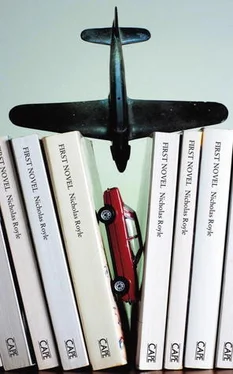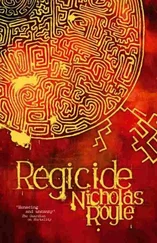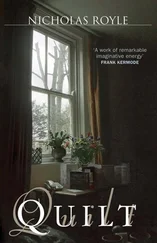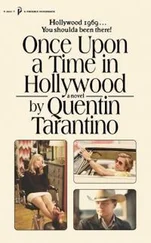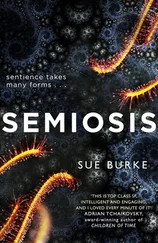Helen emails me and suggests we go on a research trip together, as previously discussed. Helen is from Bristol (I checked the information the department holds on file) and is renting a place in Fallowfield, so I suggest I pick her up one evening and we go for a drive. As we head down Kingsway, an Emirates flight passes over the road ahead of us from left to right. We come off at Cheadle Royal.
‘So are we going to John Lewis?’ Helen says. Playing with her ponytail, which she has pulled over her right shoulder, she looks very relaxed in the passenger seat of my car.
I smile, but don’t answer, as I drive past the exit for John Lewis and past the exit for Heald Green before turning left into the business and leisure park. The plane is very low now, just visible in the distance, perhaps as it passes over Ringway Road.
‘I guess that’s where you play tennis, right?’ she says, nodding at David Lloyd.
‘ If I played tennis, maybe I would play there,’ I say.
‘My dad plays at David Lloyd,’ she says. ‘A different one, obviously.’
I laugh. ‘Do I remind you of your dad?’
‘He’s older than you.’
I negotiate the roundabouts and enter the parking area behind an office building of blond brick and smoked green glass.
‘You like places like this,’ she says.
I’m not sure if it’s a question or a statement.
‘Their anonymity is interesting,’ I say. ‘The very blandness that should make them boring makes them interesting. They could be anything. The people who work here by day could be doing anything at all.’
‘What about the people who come here by night?’
‘Security guards?’
‘Isn’t this the kind of place you write about where people go dogging and piking?’
‘Do I?’
‘You gave a reading at uni, remember?’
‘What’s piking?’ I ask, looking at the bright white lights of an approaching plane in the darkening sky over the Stockport Pyramid.
‘Isn’t it watching? Dogging’s doing it and piking’s watching people do it?’
‘Sounds like you know more about it than I do.’
‘I doubt it,’ she says, pulling her fingers through her ponytail.
A car enters the parking area and drives slowly by.
‘What do you think they’re up to?’ she asks.
‘I think it’s a bit early — it’s only dusk — but you tell me.’
Helen tosses her ponytail back over her shoulder.
I start the engine and we drive out of the car park and back into the network of wide empty roads and roundabouts that serves the business and leisure park. I take the road for Heald Green and slip the Rachel’s CD into the CD player — Full on Night . I turn right into Ringway Road and slow down as we pass the Moss Nook. I try to spot another ponytail through the tiny square panes of the restaurant’s windows, but there’s a car behind us. I press my foot lightly on the accelerator, but the driver behind overtakes me with an angry sidelong glance. We’re now beyond the restaurant, but, while there’s no longer anyone behind me, I slow down again as we approach the layby on the left. I turn the wheel sharply and pull on the handbrake.
‘What’s this?’ Helen asks.
I show her the runway lights and tell her how it would once have been a good spot to sit and watch planes landing. I look over my shoulder to see the lights of an approaching airliner.
‘If the police come by?’
‘They’ll move us on.’
‘Just that?’
‘Depends what kind of mood they’re in.’
‘Have you ever spent time in a cell?’
‘Why do you ask me that?’ I snap.
‘All right, all right,’ she says, palms in the air. ‘I have, that’s all. And I’m in no hurry to do it again.’
I turn to look at her.
‘What did you do?’ I ask her.
‘I was on a demo. A load of us got rounded up and spent a night in the cells.’
I look out of the window. The plane is almost on top of us. I reach out my left arm and grab hold of something and squeeze.
‘What the fuck?’ she says.
‘Sorry,’ I say, withdrawing my hand just as quickly. ‘Must have missed the handbrake.’
Helen seems to shrink back against the door.
‘We’d better go,’ I say.
On the way back up Kingsway I point out Tesco at East Didsbury and tell her about Richard Madeley.
‘I don’t suppose you’ve heard about that. You would barely have been born.’
‘Very funny. I’m doing my project about book clubs, so I’m very interested in Richard and Judy.’
‘In that case,’ I say, ‘there’s somewhere we can have a quick look at on the way back.’
I turn left into Fog Lane and a couple of minutes later I’m turning right off Wilmslow Road into Old Broadway. This wide avenue, its only exit at the far end by foot into Fog Lane Park, is lined by large Victorian houses. Trees run down the middle. I drive up the left-hand side and stop outside number 23.
Helen looks first out of her window, then at me, eyebrows raised.
‘They lived here,’ I say. ‘Richard and Judy. When they were doing their show from Liverpool.’
‘Really?’ She is impressed.
‘Really.’
With her right hand she finds my left and gives it a little squeeze.
Grace emails and asks if we can schedule a tutorial. I tell her it’s now so close to the Residential, we might as well wait until then. The truth is I have been avoiding Grace. If she has been happy to agree to a phoner instead of a tutorial in person, that’s what we have done. I have tried to limit my feedback to highlighting clichés and any loss of verisimilitude in her dialogue. There are not a lot of problems with her work, but from time to time she fails to meet her own high standards.
I have no control over who attends the Residential; the departmental office handles such matters. Nor can I back out of it, having agreed to do it some months ago. I will just have to see how it goes. Invariably on these residential courses there is one nutjob. There is rarely more than one, but there is always, always at least one.
Lumb Bank, an old rambling house where Ted Hughes once lived, is located on the north side of a wooded gulley in a valley above Hebden Bridge. It is operated by a charitable organisation, which runs week-long residential writing courses with two tutors and a guest reader, all three published writers. Some weeks are set aside for groups from universities or other institutions with creative-writing schools, which hire the centre and its staff, and bring in their own students and writers.
My institution’s Residential is one of those weeks.
In previous years our department has assigned two tutors to the Residential. But with staffing problems at the university, the department has decided to see if the week can be run by a single tutor. Either that or none of my colleagues wanted to spend a week at Lumb Bank with me.
I arrive on the Monday afternoon. Climbing out of my car, I am greeted by Nikki, one of the three administrators. She shows me around — the main house, the woodshed, the barn and the garden — and leaves me at the door to my room on the first floor of the main house. The room has a double bed, a chest of drawers, a writing desk and chair, and a view over the garden and valley. Below the house is a large field patrolled by a pheasant with a cry that is a harsh metallic squawk. There are also two rams and a heavily pregnant ewe. Beyond this field another one runs down to the river. The far side of the valley rises steeply and is thickly wooded. Here and there, criss-crossing paths can be made out. At the top of the valley side, fifty feet higher than my vantage point, a sandstone bluff stands proud of the mixed woodland; it and the scrubby ridge either side form the horizon.
Читать дальше
